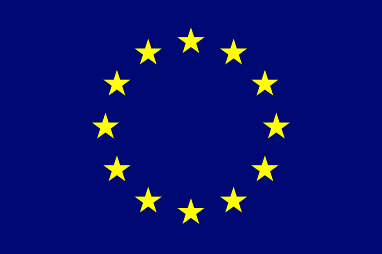Publications
Throughout the year, VOICE produces and disseminates key documents reflecting on humanitarian aid issues at the EU level and from an NGO perspective. They are addressed to decision-makers within the European institutions, at the National level, to NGO networks and other stakeholders of the humanitarian community, as well as to the VOICE members. Some documents are produced by the VOICE Secretariat with the support of VOICE members while others are publications from members and other key stakeholders in the humanitarian sector.
Please note that members-only documents will not be visible unless you are logged in.
-

HP Watch Group: Good practices around DG ECHO's HIPs and contracting cycle
13 December 2022HP Watch GroupThe Humanitarian Partnership Watch Group shares its recommendations for enhanced efficiency in DG ECHO's HIPs process and contracting cycle -

Major international response needed to save lives in Horn of Africa - Concern Worldwide
07 December 2022Members' publicationsThis press release synthesises the current humanitarian situation in the Horn of Africa, which is worsening due to the drought that has been affecting the region for several seasons. -

Humanitarian organizations condemn continued attacks on civilian infrastructure leaving people in Ukraine without water, electricity and heating in freezing temperatures - Joint statement
30 November 2022Members' publicationsThis joint statement signed by several NGOs strongly condemns the latest round of airstrikes across Ukraine by the Russian Armed Forces and includes a list of calls in order to adhere to the respect of International Humanitarian Law. -
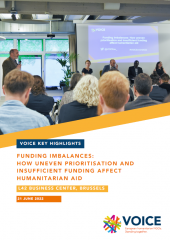
Funding Imbalances: How uneven prioritisation and insufficient funding affect humanitarian aid
30 November 2022VOICE event reportsThis paper summarises the main ideas discussed during the event 'Funding Imbalances: How uneven prioritisation and insufficient funding affect humanitarian aid', hosted by VOICE on 21 June 2022. -
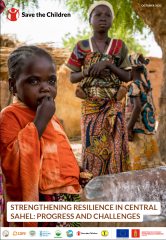
Strengthening resilience in Central Sahel: Progress and challenges - Save the Children
24 November 2022Members' publicationsThis report looks at the exceptional security, food and nutrition crisis impacting the Central Sahel countries (Burkina Faso, Mali and Niger). It also puts a focus on how other issues have exacerbated the crisis (mass displacement, high levels of conflict, flooding and drought, the impacts of the Ukraine war and political unrest).
-
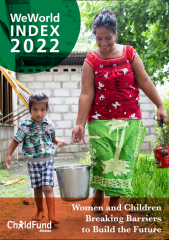
Weworld Index 2022
16 November 2022Members' publicationsThe report highlights how cascading and interlinked global crises have slowed progress towards achieving the 17 Sustainable Development Goals, with the risk of leaving the most fragile behind. -
Don't starve our future: What Action Against Hunger is calling for at COP27
10 November 2022Members' publicationsIn this document Action Against Hunger asks the political and economic leaders at COP27 to acknowledge the interconnectedness of a healthy planet to the human right to food, and to take responsibility for the food and nutrition security of current and future generations. -
Welthungerhilfe COP27: Focus on Africa. What the 2022 International Climate Conference (COP27) must achieve
07 November 2022Members' publicationsFOCUS ON AFRICA: Welthungerhilfe's expectations of the 27th United Nations Climate Change Conference -
Action Against Hunger - The Hunger Funding Gap: How the World is Failing to Stop the Crisis
27 October 2022Members' publicationsAccording to this Action Against Hunger report, "only 7% of appeals for urgent hunger-related funding through the UN humanitarian system are filled, leaving a hunger funding gap of 93%". -

Save the Children - Generation Hope: 2.4 billion reasons to end the global climate and inequality crisis
27 October 2022Members' publications"One in three children globally face double threat of high climate risk and crushing poverty" STC reports. -

Oxfam: 189 million people per year affected by extreme weather in developing countries as rich countries stall on paying climate impact costs
27 October 2022Members' publications"An average of 189 million people per year have been affected by extreme weather-related events in developing countries since 1991 – the year that a mechanism was first proposed to address the costs of climate impacts on low-income countries - according to a new report published today." -
Global Hunger Index 2022
17 October 2022Members' publicationsThe Global Hunger Index is a peer-reviewed annual report, jointly published by Concern Worldwide and Welthungerhilfe, designed to comprehensively measure and track hunger at the global, regional, and country levels. The aim of the GHI is to trigger action to reduce hunger around the world. -
VOICE key highlights: VOICE - FoRS roundtable in Prague “New humanitarian trends and challenges in delivering humanitarian aid in light of the conflict in Ukraine
13 October 2022VOICE event reportsThis document is a summary of the main ideas discussed during the round table in Prague which aimed at triggering reflections on the global and regional humanitarian context from the perspective of donors and NGOs. -
War Child: Children Paying the Highest Price of Increase in Violence in Syria
04 October 2022The article discusses how the increased violence in northern Syria is affecting thousands of children. The international community is urged not to forget the plight of families across the country with the shrinking aid options. -

44 national and international NGOs call for renewal and expansion of truce in Yemen
03 October 2022Humanitarian organizations urge all sides to the conflict that the future of the people of Yemen is in their hands as the present peace agreement is slated to end on October 2, 2022. -
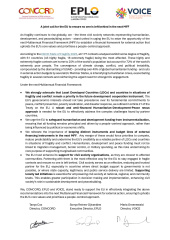
-
Tracking cash and voucher assistance - A report by Development Initiatives
29 September 2022This report tracks cash and voucher assistance during humanitarian crises, which provides a comprehensive and unique assessment of the state of tracking cash and voucher assistance (CVA) used during humanitarian crises. -
VOICE at Work 2 - Spotlight on EU Humanitarian Aid
28 September 2022VOICE at workVOICE at Work 2
Table of Contents:
Increase the humanitarian aid budget line : our advocacy at the EU level continues
Moving forward the localisation agenda of EU humanitarian aid.
New humanitarian trends and challenges in delivering humanitarian aid in light of the conflict in Ukraine: Round table in Prague
VOICE Event on Funding Imbalances in Humanitarian aid
VOICE General Assembly 2022: Highlights
An Urgent Call to Protect Principled Humanitarian Aid: VOICE Policy Resolution 2022
VOICE Out Loud 33: Enabling principled humanitarian aid
#ItTakesAVillage to support people in crises
Meet VOICE's new members
Humming Word: A humanitarian term explained
VOICE Members' publications
Other relevant Humanitarian Aid publications
Events and webinars -
The State of the Humanitarian System(SOHS)2022 Edition
22 September 2022The latest State of the Humanitarian System report 2022 was released this September. The report is an independent study by ALNAP, assessing the size, shape and performance of the humanitarian system from 2018 - 2021. The report is based on evidence from on-the-ground practitioners, crisis-affected populations, academics, policy-makers and donors. The report shares striking statistics on the huge challenges the humanitarian sector faces. -
Joint NGO Press Release - Open Letter Global Food Crisis
21 September 2022As world leaders gather for the United Nations General Assembly, 238 civil society organisations demand urgent action to save lives now. -

Time to Act not React- Report by IRC
16 September 2022Members' publicationsThe report sheds light on IRC’s recommendations for halting famine in Somalia and mitigating risk globally. -

Ripping off the band-aid. Putting people at the centre of the humanitarian system. Christian Aid Brief
22 August 2022Members' publicationsThis brief will set out how the failure to build resilience is resulting in a food crisis in East Africa, particularly in Ethiopia, Kenya and South Sudan. Christian Aid recommends governments and others to invest in structural changes to improve the resilience of people, governments, policies and systems. -
Unfreeze Afghan assets or more hungry children may die: INTERSOS Op-Ed
12 August 2022Members' publicationsFollowing decades of conflict, people in Afghanistan are now grappling with another deadly issue as almost universal poverty grips the nation: soaring hunger. -
A children's crisis - A Report by World Vision
12 August 2022Afghanistan is a country defined by the resilience and tenacity of its citizens – of its communities, its families, its children. Despite years of conflict, political changes, economic instability, and natural disasters, hard won development gains were realised, beginning to open doors for new opportunities and brighter futures for Afghanistan’s girls and boys. -
Warm Welcomes, Lurking Tensions: World Vision Report
10 August 2022Members' publicationsIn the initial phases of any refugee crisis, host communities are usually welcoming, yet tensions can and inevitably do arise and relations often deteriorate. Ukrainian too are at risk from anti-refugees tensions says World Vision in this report.

